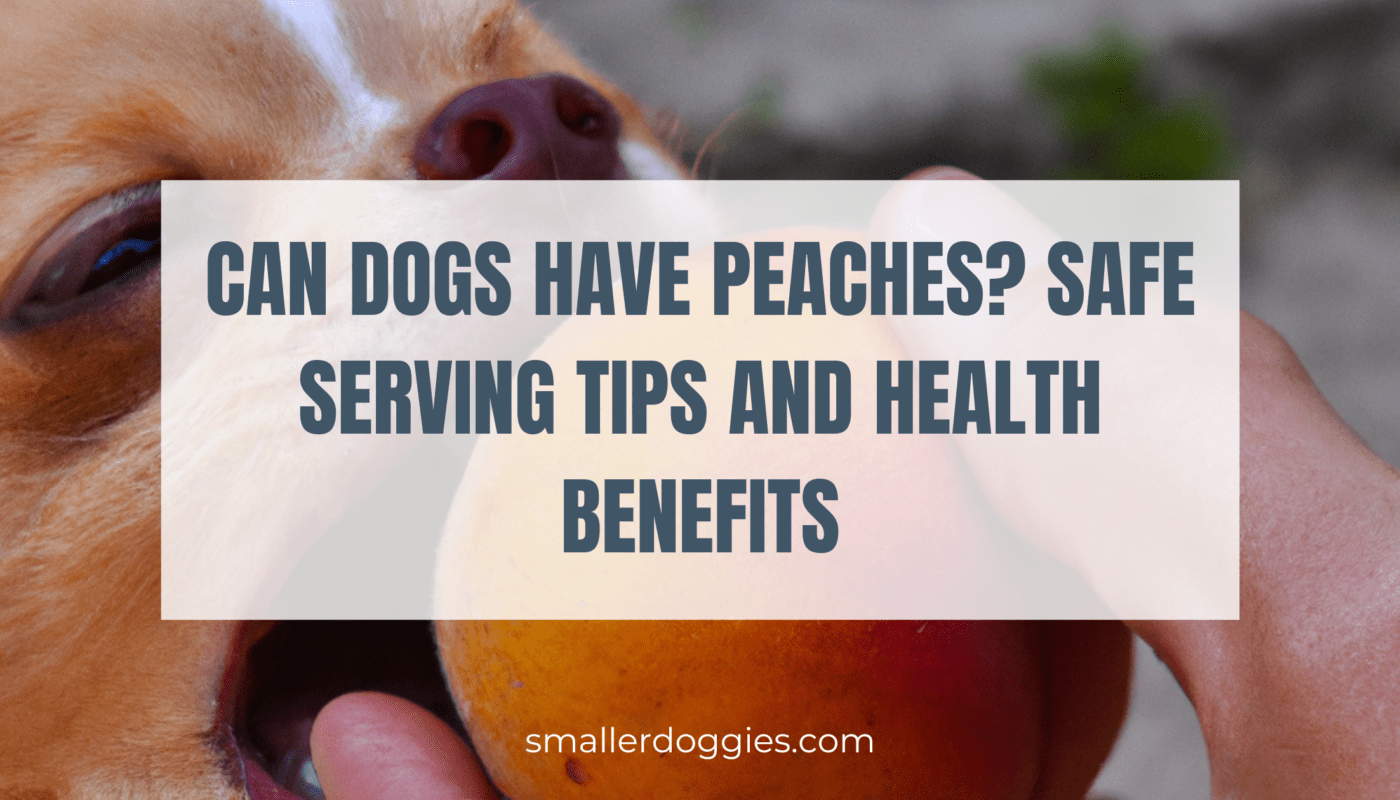Post Disclaimer
This post may contain affiliate links. If you use these links to buy something we earn a commission at no extra cost to you. Smaller Doggies is supported by its audience, Thank you!
You may be wondering: Can dogs have peaches? Yes! Dogs can, but there are some important things you need to know. Peaches are not toxic to dogs, and in small amounts, they can even offer health benefits.
Fresh peach flesh is safe and can provide essential vitamins, such as vitamin A and C. Make sure to remove the pit, as it contains cyanide and can be a choking hazard. Moderation is key to avoiding potential digestive issues.
Peach skin can be a bit tricky, as some dogs may have trouble digesting it, leading to stomach upset. Always wash the fruit thoroughly to remove any pesticides or chemicals. By following these guidelines, you can safely incorporate peaches into your dog’s diet.

Nutritional Benefits of Peaches for Dogs
Peaches provide several nutritional benefits for dogs, including essential vitamins, fiber for better digestion, and important antioxidants and minerals that support overall health.
Vitamin Richness
Peaches are rich in vitamins that are beneficial for your dog’s health. They contain Vitamin A, which supports vision and skin health. Also, Vitamin C helps boost the immune system. Regular consumption, in moderation, can contribute positively to these areas.
Additionally, peaches have small amounts of Vitamin E. Together, these vitamins help maintain your dog’s immune function, skin, and coat quality. Including vitamin-rich fruits like peaches can be a tasty way to supplement your dog’s diet.
Fiber and Digestion
Peaches contain dietary fiber, which can aid in your dog’s digestion. Fiber helps regulate bowel movements and can be beneficial in preventing constipation. Including moderate amounts of peaches in your dog’s diet may help maintain a healthy digestive system.
Soluble fiber in peaches can help manage blood sugar levels by slowing down the absorption of sugar. This can be particularly useful for dogs prone to or suffering from certain metabolic conditions. Always ensure that any fruit is given in proper portions to avoid a digestive upset.
Antioxidants and Minerals
Peaches are packed with antioxidants, which can help combat oxidative stress and inflammation. These antioxidants support the overall well-being of your dog. Including fruits rich in antioxidants can contribute to long-term health benefits.
In addition, peaches contain essential minerals like potassium, magnesium, and copper. Potassium supports normal muscle function, magnesium is essential for various metabolic functions, and copper helps with red blood cell formation. Offering peaches as a treat can provide your dog with these valuable nutrients.
Possible Health Risks and Concerns
Feeding peaches to dogs can present several health risks, including toxicity from peach pits, high sugar content, choking hazards, and potential allergic reactions.
Toxicity of Peach Pits
Peach pits contain cyanogenic glycosides, which can break down into cyanide when ingested. Cyanide is highly toxic and can lead to cyanide poisoning. Symptoms of cyanide poisoning include difficulty breathing, excessive drooling, and vomiting. Ensuring that your dog does not consume the pit is crucial. Even if not toxic, the pit can also be a choking hazard or cause intestinal blockage.
Sugar Content and Diabetes
Peaches, like many fruits, contain natural sugars. Feeding your dog too many peaches can contribute to diabetes and obesity due to the high sugar content. Dogs that already suffer from diabetes should avoid sugary fruits. Monitor the amount of peaches given and avoid any peaches with preservatives or added sugar, which could exacerbate health issues.
Choking Hazards and Intestinal Blockage
The pit of a peach poses a choking hazard if swallowed whole. In smaller dogs, even peach segments can be difficult to swallow. Moreover, small pieces could lead to intestinal blockage. Symptoms of blockage include vomiting, diarrhea, and constipation. Always remove the pit and cut the fruit into manageable sizes for your dog.
Allergic Reactions and Upset Stomach
Some dogs might have allergic reactions to peaches, leading to stomach upset. Symptoms can include vomiting, diarrhea, and itchy skin. In severe cases, you might notice swelling of the esophagus or face. It’s advisable to introduce peaches slowly into your dog’s diet and observe for any adverse reactions. If any symptoms appear, discontinue feeding immediately and consult a vet.
Preparation and Feeding Guidelines
When giving peaches to your dog, it’s crucial to consider proper serving size, choose fresh over preserved, and remove hazardous parts to ensure your dog’s safety and health.
Proper Serving Size and Moderation
Feeding your dog peaches should be done in moderation to avoid digestive issues. A few small slices of peach flesh are typically enough for most dogs. For example, you can give a small dog one or two slices, while a larger dog might handle three or four.
Fresh vs. Preserved Peaches
Fresh peaches are the best choice for dogs. They contain fewer additives and more natural nutrients. Avoid preserved or canned peaches because they often have added sugars, syrups, and preservatives that are harmful to dogs.
Frozen peaches can be a good alternative but ensure they are free from added chemicals. Always read labels carefully to avoid unwanted ingredients that could harm your pet.
Consulting with a Veterinarian
Before feeding your dog peaches, it’s vital to consult with a veterinarian.
Veterinarians can provide insights into your dog’s unique health needs and dietary restrictions. Peaches, while nutritious, can cause issues like allergic reactions or upset stomachs in some dogs.
Watch for symptoms such as:
- Vomiting
- Diarrhea
- Itching or swelling
Consulting a vet helps you avoid adverse reactions and ensure safe feeding practices for your dog.
In conclusion, peaches can be a delicious and nutritious treat for your dog when served correctly. The key is to offer them in moderation, ensuring the pit is removed and the fruit is properly washed. By incorporating peaches into your dog’s diet, you can provide essential vitamins, fiber, and antioxidants that support their overall health. Always consult with your veterinarian before introducing any new food to your pet’s diet to ensure it’s appropriate for their specific health needs. With careful preparation and mindful serving, peaches can be a safe and enjoyable addition to your dog’s treat repertoire.
Frequently Asked Questions
Feeding peaches to dogs can come with certain precautions. Key aspects to consider include the safety of peach pits, possible reactions to peach skin, and the appropriateness of various peach products.
Is it safe for dogs to eat peaches without the pit?
Yes, it is safe for dogs to eat peaches if the pit is removed. The pit can pose a choking hazard and also contains cyanide, which is toxic to dogs.
Can dogs have a reaction to eating peach skin?
While peach skin is generally safe, some dogs may have an allergic reaction. Symptoms can include itching, vomiting, or diarrhea. If your dog shows any of these signs, consult your veterinarian.
What should I do if my dog eats a canned peach?
Canned peaches often contain added sugars and preservatives, which are harmful to dogs. If your dog eats a canned peach, monitor them closely and contact your vet if you notice any adverse reactions.







